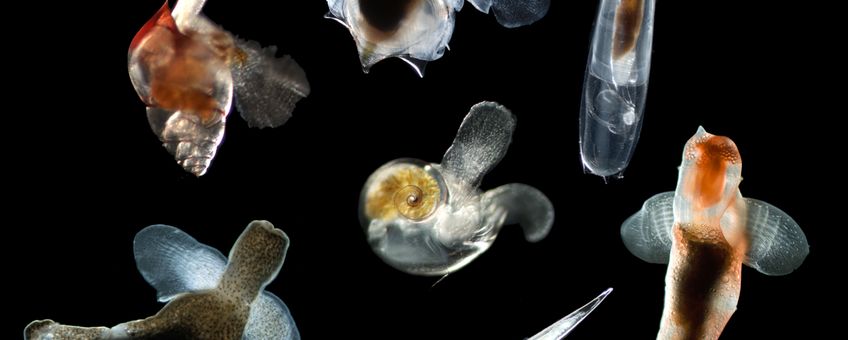
Ocean's canaries have survived previous perturbations in the Earth's carbon cycle
Naturalis Biodiversity CenterPteropods as sentinels of the impacts of ocean acidification
Pteropods are marine gastropods that spend their entire life in the open water column. A remarkable example of adaptation to pelagic life, these mesmerizing animals have thin shells and a snail foot transformed into two wing-like structures that enable them to 'fly' through the water column. Pteropods are a common component of planktonic foodwebs worldwide and are major contributors to pelagic calcification. Hence, they play important roles in the ocean's biological carbon pump.
Shelled pteropods have been a focus for global change research because they make their shells of aragonite, a metastable form of calcium carbonate that is 50% more soluble than calcite. As their shells are susceptible to dissolution, pteropods have been called 'canaries in the coal mine' or sentinel species that signal the impact of ocean acidification on marine calcifiers. Although shelled pteropods are already negatively affected in several regions of the global ocean, and will likely be seriously threatened if CO2 levels continue to rise, little was known about the evolutionary history of the group. Knowing whether major groups of pteropods have been exposed to periods of high CO2 is important to extrapolate from current experimental and observational studies to predictions of species-level responses to global change over longer timescales.
 Sea angel Clione antarctica (Source: Katja Peijnenburg and colleagues)
Sea angel Clione antarctica (Source: Katja Peijnenburg and colleagues)
Sea butterflies and sea angels diverged in the Early Cretaceous
In addition to having thin, aragonitic shells, some groups of pteropods have only partial shells or are naked as adults (such as the sea angels), which leaves us with a patchy fossil record. Abundant pteropod fossils are only known from the Eocene onwards (from 56 million years ago) and mostly represent the fully-shelled species (sea butterflies). This has led to the notion that pteropods are a relatively recent group of gastropods. However, resolving the timing and diversification of pteropods accurately required a combination of molecular and fossil-based approaches.
This new study sampled 21 pteropod species across two basin-scale ocean transects as part of the Atlantic Meridional Transect programme and collected information on 2654 genes. The researchers employed a phylogenomic approach, that was calibrated using key pteropod fossils, showing that the two major groups of pteropods, sea butterflies and sea angels, diverged in the early Cretaceous (~139 million years ago). Hence, both groups are much older than previously thought and must have survived previous episodes of widespread ocean acidification, such as at the end of the Cretaceous (K-Pg, 66 million years ago) and the Paleocene-Eocene Thermal Maximum (PETM, 56 million years ago).
Although these results suggest that pelagic aragonitic calcifiers have been more resilient to past ocean acidification than currently thought, it is unlikely that pteropods have experienced global change of the current magnitude and speed during their entire evolutionary history. Lead author of the study, Dr. Katja Peijnenburg from Naturalis Biodiversity Center in the Netherlands, explains "current rates of carbon release are at least an order of magnitude higher than we have seen for the past 66 million years". Hence, she stresses to add the disclaimer "past performance is no guarantee of future results".
 Sea butterfly Cavolinia uncinata (Source: Katja Peijnenburg and colleagues)
Sea butterfly Cavolinia uncinata (Source: Katja Peijnenburg and colleagues)
Climate change and the ocean's role
It is sometimes forgotten that the ocean plays a major role in regulating the climate and supporting life on our planet. The open ocean is the largest habitat on Earth, microscopic algae produce half of the world's oxygen, and the ocean has already absorbed more than 90% of excess heat and 30% of excess CO2 from the atmosphere since global industrialization. However, this is not without consequences.
In the past, changes in ocean processes, including circulation, the biological pump and calcium carbonate precipitation were responsible for fluctuations in atmospheric CO2. Now, for the first time in millions of years, the role of the ocean and atmosphere has been reversed: today it is the atmosphere that controls ocean chemistry leading to an increasingly acidified ocean. It is still an open question whether marine organisms, particularly those that calcify, have the evolutionary resilience to adapt fast enough to these changes.
The science team collaborating on this research included Katja Peijnenburg, Arie Janssen, and Deborah Wall-Palmer from Naturalis Biodiversity Center, Leiden, the Netherlands; Erica Goetze from the University of Hawai'i at Mānoa, U.S.; Amy Maas from the Bermuda Institute of Marine Sciences, Bermuda; Jonathan Todd from the Natural History Museum, London, U.K., and Ferdinand Marlétaz from the Okinawa Institute of Science and Technology, Japan.
More information
- Article The origin and diversification of pteropods precede past perturbations in the Earth's carbon cycle
Text: Katja T.C.A. Peijnenburg, Arie W. Janssen, Deborah Wall-Palmer, Erica Goetze, Amy Maas, Jonathan A. Todd, Ferdinand Marlétaz
Photos: Katja Peijnenburg; Erica Goetze; Deborah Wall-Palmer; Lisette Mekkes
More images and video footage of these organisms are available from: Katja Peijnenburg.
